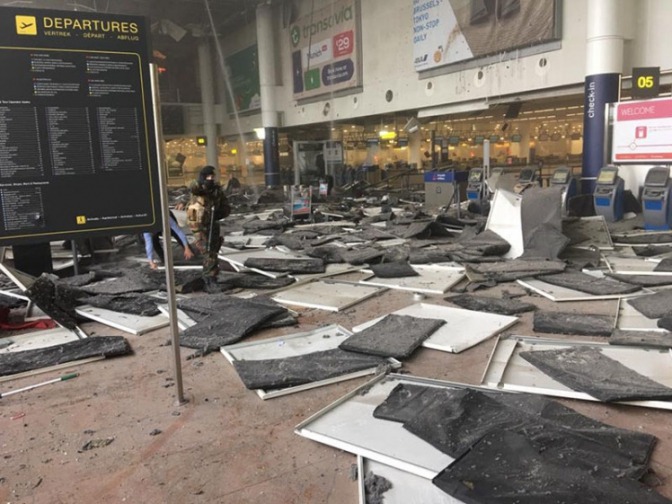People who work in and around the EU institutions tend to operate in a Brussels bubble, insulated from the insecurity elsewhere in Europe. But on 22 March, the Brussels bubble burst. The bloodbath at Zaventem airport and Maelbeek metro station was not the first terrorist attack in the Belgian capital in recent years, of course: four people were killed in May 2014 when a gunman opened fire at the Jewish Museum of Belgium. But the latest tragedy is of another order of magnitude: over 30 victims dead and some 340 wounded. Islamic State terrorists struck right at the heart of the EU quarter, as well as in the airport terminal that almost every reader of Brussels Times will have passed through. And following on from the attacks in Paris last January and November, there is every reason to think that they will strike again.
Europeans are facing a new age of insecurity. Economic insecurity, with economies stagnant, unemployment high and fears that the future will be worse. Political insecurity, with the EU seemingly overwhelmed by the eurozone, refugee and other crises, Britain threatening to vote to leave, and nationalists and xenophobes increasingly popular. And now physical insecurity too.
For sure, the statistical chances of being killed in a terrorist attack remain extremely low. But such attacks are designed to have a disproportionate emotional impact. Suddenly, your daily routine may feel dangerous. Strangers and crowds may appear threatening. Governments’ pledges to keep citizens safe may seem hollow – not least in Brussels, where counterterrorism efforts seem particularly disorganised and inadequate.
Shameless politicians are quick to capitalise on such fears. Nigel Farage, the leader of the anti-immigrant, anti-EU UK Independence Party, waited less than two hours after the Zaventem blasts to blame the EU and argue that Britain would be safer if it left. Poland’s new hardline nationalist government seized on the Brussels attacks as a pretext to drop its commitment to accept refugees resettled from Greece and Italy by the EU. Donald Trump, the likely Republican candidate in the US presidential election in November, restated his position that America should deny entry to all foreign Muslims.
Europe’s new insecurity is palpable on its borders. Vladimir Putin’s Russia has officially annexed Crimea, unofficially invaded south-eastern Ukraine and threatens the Baltic states and beyond. Libya has descended into murderous anarchy. Syria’s civil war and Islamic State barbarism are destabilising Turkey and forcing out millions of refugees. Desperate migrants who arrive in Greece are now locked up in detention camps, while those who make it to the Macedonian border face a wall patrolled by the army. Whereas once the EU spread stability to its neighbourhood, the crescent of instability to its east and south is now spilling over into the EU. The delusion that the EU could live in a postmodern bubble where rules and soft power replaced power politics and the use of force has burst.
The knee-jerk reaction is to want to close the borders, shut out the outside world and return to living in a bubble. But that is scarcely a solution. Insecurity strikes all across Europe, not just through its borders. Islamic State does not need to infiltrate its terrorists into the EU masquerading as refugees: it can recruit disaffected EU citizens, both Muslims and converts, as suicide bombers, online or through local mosques. The Brussels bombers were born in Belgium, most of the Paris attackers in France. Likewise, Putin does not need to invade the EU to destabilise and fragment it: the Kremlin instead bankrolls far-right extremists, notably Marine Le Pen’s National Front in France, to do its dirty work. The enemies of our liberal, open societies lie within too.
How, then, should Europeans respond? The starting point is to remain calm and civilised. Islamic State’s aim is to provoke a backlash against Muslims that wins it new recruits and sparks the all-out clash of civilisations that, it hopes, will see its caliphate triumph. Putin likewise wants Europeans to turn on each other and the EU to break up. So every time Nigel Farage, Marine Le Pen and Hungary’s Viktor Orban attack Muslims, the jihadis and Putin cheer. Sensible Europeans should not play their game.
People who feel safe are less likely to succumb to extremism. That’s yet another reason why governments need to step up their efforts to combat terrorism. Security budgets were slashed after the end of the Cold War and have again been cut during the current economic crisis. Now they need to rise again.
The immediate priority is to beef up counterterrorism police and intelligence services. They need more money, more staff, better technology and, in the case of Belgium, better organisation. The intelligence services also need to do more to infiltrate Islamic State networks, potentially by turning disenchanted jihadists into informants.
At the same time, governments need to make greater efforts to prevent and counter radicalisation. Saudi funding for mosques that preach jihad should be cut off; if the imams are foreign, they should be expelled. Jihadists in jail should be isolated from prisoners susceptible to radicalisation.
The economic and social marginalisation of migrants and their children in countries such as Belgium is no excuse for terrorism. But disaffected young men who feel excluded from society are more vulnerable than most to those who offer them a twisted purpose, a sense of belonging and the promise of a place in heaven by joining the Islamic State death cult. Opening up the labour market, vigorously combating discrimination and making everyone feel part of society are all important.
Finally, EU governments need to work together much more effectively. Police forces and intelligence services need to share information better. Salah Abdeslam, the logistics mastermind of the Paris attacks in November who was finally arrested just before the Brussels ones, was able to escape from France to Belgium because Belgian police were not aware that he was wanted.
At a foreign-policy level, if Western governments are unwilling to commit ground troops to combat Islamic State in Syria and Iraq and eradicate its terrorist-training camps, they should at least fund and arm the Kurdish and other rebels fighting them.
All of this will take time and effort. There are no easy, quick-fix solutions. But Europe’s enemies can eventually be stopped. For fifteen years, the US government has prevented a repeat of 9/11 on American soil. After the Madrid train bombing in 2004 and the London Tube and bus bombings in 2005, Al-Qaeda was stopped in its tracks. Now Islamic State must be defeated too.
By Philippe Legrain


